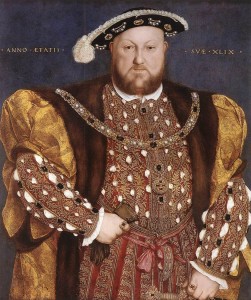 On this day in history, 30th September 1544, King Henry VIII returned to England after his victory in Boulogne. The French forces had surrendered on 13th September after a siege which had lasted from 19th July. Edward Hall records the campaign in his chronicle:
On this day in history, 30th September 1544, King Henry VIII returned to England after his victory in Boulogne. The French forces had surrendered on 13th September after a siege which had lasted from 19th July. Edward Hall records the campaign in his chronicle:
“The fourtene day of July the kynges maiestie in his royall persone passed the ses from Douer to Calis, and the six and twentie day encamped him selfe before Bolleyn, on the north syde within lesse then halfe a myle of the toune where his grace remayned tyll the toune was surrendered vnto his maiestie: the which toune he so sore assauted & so beseged with suche aboundance of greate ordinaunce that neuer was there a more valiauter assaute made, for besyde the vndermyning of the castel, tower and walles, the toune was so beaten withe ordinaunce that there was not left one house whole therein: & so sore was laied to the charge of the Frechmen that after the kyng had assauted theim by the space of a moneth, thei sent furth of the toune to the kyng two of their chief captaynes, called Mounsire Semblemound, & Mounsire de Haies, whiche declared that the chief capitayne of the toune with his retinew was conteted to delyuer the toune vnto his grace, so that they might passe with bag and baggage, which request the kynges maiestie, mercifully grauted theim. And so on the next day, the duke of Suffolke rode into Bullein, to who in the kynges name, they deliuered the keyes of the toune. And at after none departed out of Bulleyn al the Frenchmen. The nober of the men of warre, that wer strong and galaunt, that came out of the toune, were of horsemen, lxvii. of footmen, xv. C.lxiii. of Gonners viii.C. of hurte menne. lxxxvii. of women and chyldren. xix.C.xxvii. So there was in al that came oute of the toune, foure thousand, foure hundred, fiftie and foure, beside a great nomber of aged, sicke and hurt persones, that was not able to go furth of the toune. The last person y came furth, was Monsire de Veruine, grand capitaine of the Toune, which when he approched nere the place, wher the king stode, he alighted from his horse, and came to the king. And after he had talked with hym a space, the kyng toke him by the hand, and he reuerently kneling vpon his knees, kyssed his hande, and afterwarde mounted vpon hys horse and so departed.
The. xviii. day, the kinges highnes hauyng the sworde borne naked before him, by the Lorde Marques Dorset, like a noble and valyaunt conqueror rode into Bulleyn, and the Trompetters standyng on the walles of the toune, sounded their Trompettes, at the time of his entring, to the great comfort of al the kynges true subjectes, thesame beholdyng. And in the enteryng there met him the duke of Suffolk, and deliuered vnto him the keyes of the toune, and so he roade toward his lodgyng, which was prepared for him, on the South side of the toune. And within two dayes after, the kyng rode about al the toune, within the walles, and then commaunded that our Lady Church of Bullein, should be defaced and plucked doune, where he appoynted a Mout to be made, for the greate force and strength of the toune.
When the kyng had set all thinges ther in suche ordre, as to hys wisdom was thought best, he returned into England, to the great rejoysynge of al hys louyng subjectes.”
It hadn’t quite been Agincourt, but Henry VIII was triumphant.
Note: A tip for reading old spelling like this is to read it aloud. Also, “u”s and “v”s are often interchangeable and “y”s are used instead of “i”s, hence “hauyng” is “having”. Hope that helps!
Note also that Boulogne is spelled different ways in the same passage – Bolleyn, Bullein and Bulleyn. This is because there was no standardized spelling at the time. It was the same with “Boleyn”.
Notes and Sources
- Hall, Edward. Hall’s Chronicle, p861-862 – You can read Hall’s Chronicle at http://openlibrary.org/books/OL7060976M/Hall%27s_chronicle